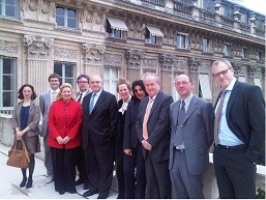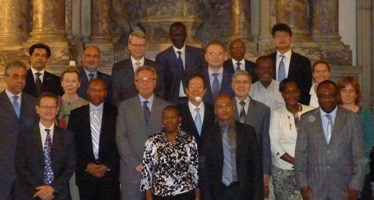|
In this issue:
|
|
|
All decisions of the June plenary
- Held an exchange of views with Mr Verherstraeten and Mr Wathelet, State Secretaries for Institutional Reforms of Belgium, and adopted the opinion on the revision of the Constitution of Belgium; - Held an exchange of views with Mr Robert Repassy, Minister of State for Justice of Hungary, and adopted the opinions on:
o
the Act on the Election of Members of Parliament of
Hungary; - Held an exchange of views with Mr Igor Kapyrin, Deputy Permanent Representative of the Russian Federation to the Council of Europe and with Mr Vladimir Zimin from the Office of the Prosecutor General, and adopted the opinion on the Federal Law of the Russian Federation on the Federal Security Service (FSB); - Held an exchange of views with Mr Kapyrin, Ms Natalia Polyakova from the Office of the Prosecutor General and Mr Alexander Kurmaz from the Ministry of Foreign Affairs of the Russian Federation and adopted the opinion on the Federal Law of the Russian Federation on Combating Extremist Activity; - adopted the opinions on
•
legal certainty and the independence of the
judiciary in Bosnia and
Herzegovina;
|
Selected opinions
On 16 December 2011, the Parliamentary Assembly of the Council of Europe requested opinions from the Venice Commission on five Russian Federation Laws, including laws on the FSB and on combating extremist activity. The Venice Commission stressed that the protection and respect of fundamental rights represents an essential condition for the operation of security services as part of a democratic society and requires solid and specific guarantees. The Venice Commission stated that it was of crucial importance that, in a law such as the Extremism Law, which has the capacity of imposing severe restrictions on fundamental freedoms, a consistent and proportionate approach that avoids all arbitrariness be taken. |
On 20 January 2012, the Minister of Foreign Affairs of Hungary requested the Venice Commission of the Council of Europe for an opinion on several pieces of legislation recently revised, notably Act CCIII on the Elections of Members of Parliament of Hungary (official translation into English received by diplomatic channels on 7 March 2012; CDL-REF(2012)003). Following this request, the Venice Commission and the OSCE Office for Democratic Institutions and Human Rights (OSCE/ODIHR) prepared an opinion on the Act.
On 1 February 2012, the President of the Monitoring Committee of the
Parliamentary Assembly of the Council of Europe asked the Venice Commission
to provide an opinion on the Act on the Rights of Nationality of Hungary
(CDL-REF(2012)014). |
|
|
|
|
|
|
||||||||||||||||||||
|
|
||
|
Contact us |
|
Unsubscribe |
![]()




